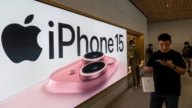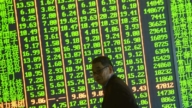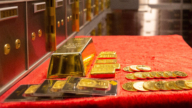【新唐人2013年12月25日訊】人民幣在國內的購買力持續下降,而人民幣匯率卻不斷走高,這種持續內貶外升的現象令國人困擾,「人民幣對不起中國人﹗」似乎已經形成共識。不過專家指出,中共的利率貨幣政策,造成的大量外匯儲蓄和人民幣內貶外升現象,也給中國帶來了負擔。但是有一種人卻從中受益,我們來看看他是誰。
近年來,伴隨著人民幣對內貶值和對外升值,中共權貴掠奪國家資源和全民的財富轉移到海外後,在國外瘋狂購買房產、地產和奢侈品,導致各國當地物價飆漲。
最近,美國休士頓,一個包含9個項目,近2,600套出租式公寓的收購大單,被中國私募基金與美國合作企業連手收入囊中,其中的私募基金——博裕投資的主要合夥人,其中就有中共原黨魁江澤民27歲的孫子江志成。
另外,香港政府雖然努力給樓市降溫,努力避免資產泡沫,但來自中國大陸的資金令港府很難控制住房價。
旅美經濟評論專家傑森.馬:「它在國外的購買力是在增強,這就是為甚麼中國人到美國旅遊的時候,洗劫美國整個名牌店,能有機會旅遊的人,這些人是賺到了,但是僅僅能維持在國內生存的人,物價越來越高,水快淹到脖子的這種掙扎的感覺。」
最近美聯儲宣佈,維持0.0%-0.25%的低利率。而在中國大陸銀行間的持續錢荒又掀高潮,相關利率已經達到6%以上。中共權貴所握資金,又利用高額的匯率差和利率差,從海外殺回大陸套利吸金,導致通貨膨脹加劇。經濟學家指出,隨著美聯儲逐漸退出量化寬鬆,以及經濟復甦,這些資金獲利後又會撤出,被吸引回歸美國。
大陸金融分析師任中道:「大量熱錢的流入也導致人民幣升值。外幣來套利嘛,國外的資金要到國內來,央行就要發行人民幣來進行這種等值的對沖,它就會不斷的發下去。」
目前,中國已成為世界第一大貨幣發行國,截至11月末,中國廣義貨幣餘額已經達到107萬9300億元,與之相背離的是,大陸金融系統卻持續錢荒。在號稱世界第二大經濟體的中國,老百姓卻叫苦連天。
以往二十年,投資對中國經濟增長貢獻率,約在百分之五十左右。低利率又是刺激投資的有效手段,導致了「血徵」、「血拆」蔓延中國。在二千萬上訪大軍中,其中被強徵、強拆的約佔百分之七十以上。
傑森.馬:「中共為了刺激經濟大量的印鈔票,造成了通脹,國內的貶值其實就是貨幣發行量造成的。但是同時它又對外限制自由兌換貨幣,控制人民幣自由兌換,中國是一個出口為主的國家,造成國外人民幣短缺的現實,造成人民幣在國外又在升值。」
一九九四年匯率改革後,代表本國與外國進行經濟交易而發生的中國經常項目,和資本項目一路順差,經濟畸型高速增長,引起全球資本流入,使資本項目的順差進一步擴大。外匯儲備逐年攀升,外匯處於供過於求的狀態。
1993年底,中國外匯餘額僅1432億美元,1994年外匯改革後,年底中國外匯餘額上升到4482億美元,2000年底達到14291億美元。
傑森.馬:「目前中國龐大的外匯儲備,不是中國的驕傲,是中國負擔,它不得不把國外的貨幣作為財富承擔的載體,國外人家就把貨幣貶值,國內的財富就在縮水。」
對於依賴出口拉動經濟的中共來說,要獲得外貿交易,要做出外貿順差,不得不答應合作國家要求人民幣升值的要求。
國內經濟律師鄭恩寵指出,在中央集權及人治型的貨幣發行機制下,央行對基礎貨幣的投放越來越被動,人民幣長期「內貶外升」,不僅不能加強中共的執政地位,恰恰是促使「亡黨失政」重要動因。
採訪編輯/劉惠 後製/陳建銘
RMB Devaluation: Who Wins?
While the purchasing power of RMB continues to decline
in Mainland China, the exchange rate has continued to rise.
This phenomenon has troubled Chinese people. People
complain, saying, “RMB should be sorry to the Chinese."
Experts say that the Communist Communist Party (CCP)
currency policy has created huge foreign exchange reserves.
It has also created the devaluation of RMB in China,
high exchange rate overseas, and a burden to China.
As for who is exactly benefiting
from this policy, we will take a look.
In recent years, China has seen depreciation of the RMB
domestically, and appreciation in foreign exchange rates.
Elite groups of the CCP have plundered national
resources and wealth, transferring them overseas.
This is done through buying overseas
properties, real estate, and luxury goods.
This leads to soaring prices in the foreign countries.
Recently, Chinese buyers have purchased
property in Houston, USA, containing nine projects,
and approximately 2,600 rental apartments.
Among them is Boyu Capital, a Chinese private equity fund.
Reportedly, Jiang Zemin’s 27-year-old grandson,
Jiang Zhicheng, is a major investor in Boyu Capital.
In addition, Hong Kong, has tried to cool down
the property market, to avoid a property bubble.
Investment from China has made it hard to control.
Jason Ma, financial expert: “RMB
purchasing power abroad is strong.
That’s why Chinese tourists have
swamped branded stores in the US.
To those who take advantage of traveling
and shopping, they are the winners.
But to those who struggle to make both ends
meet, they are faced with higher and higher prices."
The US Federal Reserve has decided
it’s fund rates unchanged at 0.0-0.25%.
Interbank rates have gone as high as 6% in China.
CCP officials thus take advantage of high interest rate
differentials, and make profits from huge assets they hold.
They do this by transferring them
back to China to absorb the interests.
As a result, inflation is further increased in China.
Economists explain that following the end of the
Federal Quantitative Easing policy, and recovery
of the economy in the US, those funds will transfer
back to the US after absorbing interests in China.
Ren Zhongdao, financial analyst: “Inflow of hot
money will lead to the appreciation of the RMB.
As foreign currency rushes into China to absorb interests,
the central bank will issue RMB to balance the needs.
This will continue."
China has become the world’s largest currency issuing country.
As of the end of November, China’s broad measure of money
supply, called M2, exceeded 107 trillion yuan ($17.6 trillion).
This is despite the lasting cash crunch
of the Chinese finance sectors.
In the world’s second largest
economy, China, people are suffering.
In the past two decades, investment has contributed
to around 50% of China’s economic growth.
Low interest rates, as an effective means of
stimulating investment, have led to forced land
acquisition, and forced demolition throughout China.
Among some twenty million petitioners, over 70% of them
are victims of forced land acquisition and forced demolition.
Jason Ma: “To stimulate the economy, the CCP
injects huge amounts of cash, and creates inflation.
The devaluation of the RMB in China
is being caused by the printed money.
However, the CCP also limits free
conversion to foreign currencies.
China relies heavily on exports.
Its policy has thus created shortages of RMB overseas,
and the appreciation of the RMB in foreign countries."
Since the 1994 exchange rate reforms, surplus
has occurred as a result of Chinese industries
and projects with frequent international trades.
Abnormal economic growth has attracted global
capital inflows, and has created further surplus.
Foreign exchange reserves have
increased beyond adequate levels.
By the end of 1993, China’s foreign
exchange reserve was $143.2 billion.
After the 1994 foreign exchange reforms, foreign exchange
reserves rose to $448.2 billion at the end of that year.
By the end of 2000, it had reached $1.4291 trillion.
Jason Ma: “China’s huge foreign exchange reserves
are not the pride of China, but are the burden to China.
Foreign currencies have become the carriers of wealth.
Once foreign currency is devaluated,
domestic wealth starts to shrink."
An export-led economy has forced the CCP to agree
with trading countries demands to appreciate the RMB.
This is in order to achieve the trade surplus.
Deng Enchong is a lawyer specializing in finance.
Deng Enchong indicates that under centralization, the central
bank’s injection of cash has become even more passive.
The CCP’s ruling will only become weaker
with a prolonged devaluation of the RMB
domestically and appreciation internationally.
This will also serve as a driving cause
to finally extinguish the party and it’s rule.
Interview & Edit/LiuHui Post-Production/ChenJianming

























